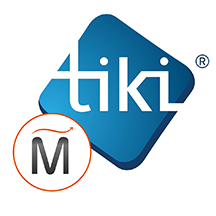Tiki Wiki CMS


Please feel free to contact us
Go
Tiki contains a number of collaboration features allowing it to operate as a (GeoCMS) web application.
Tiki includes all the basic features common to most CMSs such as the ability to register and maintain individual user accounts within a flexible and rich permission / privilege system, create and manage menus, RSS-feeds, customize page layout, perform logging, and administer the system. All administration tasks are accomplished through a browser-based user interface.
Tiki features an all-in-one design, as opposed to a core+extensions model followed by other CMSs. This allows for future-proof upgrades (since all features are released together), but has the drawback of an extremely large codebase (more than 1,000,000 lines).
Tiki can run on any computing platform that supports both a web server capable of running PHP 5
Tiki has four major categories of components: content creation and management tools, content organization tools and navigation aids, communication tools, and configuration and administration tools. These components enable administrators and users to create and manage content, as well as letting them communicate to others and configure sites.
You can subscribe to Tiki Wiki CMS, an AWS Marketplace product and launch an instance from the Tiki Wiki CMS product’s AMI using the Amazon EC2 launch wizard.
Step 1: Hit the browser with the public IP of the running instance as: http://<public IP>
Select your language and click “Continue”.
Step 2: click “Continue”.
Step 3: click “Continue”.
Step 4: Enter database details as below:
Database name: tikiwiki
Username: root
Password: <instance ID>
Step 5: click “Install”.
Step 6: click “Continue”.
Step 7: Enter the admin details as you like and click “Continue”.
Step 8: click “Continue”.
Step 9: Click on “Enter Tiki and Lock Installer”.
Step 10: Enter the password as you like and enjoy the application.
All your queries are important to us. Please feel free to connect.
24X7 support provided for all the customers.
We are happy to help you.
Submit your Query: https://miritech.com/contact-us/
Contact Numbers:
Contact E-mail:
Traditional hosting services generally provide a pre-configured resource for a fixed amount of time and at a predetermined cost. Amazon EC2 differs fundamentally in the flexibility, control and significant cost savings it offers developers, allowing them to treat Amazon EC2 as their own personal data center with the benefit of Amazon.com’s robust infrastructure.
When computing requirements unexpectedly change (up or down), Amazon EC2 can instantly respond, meaning that developers have the ability to control how many resources are in use at any given point in time. In contrast, traditional hosting services generally provide a fixed number of resources for a fixed amount of time, meaning that users have a limited ability to easily respond when their usage is rapidly changing, unpredictable, or is known to experience large peaks at various intervals.
Secondly, many hosting services don’t provide full control over the compute resources being provided. Using Amazon EC2, developers can choose not only to initiate or shut down instances at any time, they can completely customize the configuration of their instances to suit their needs – and change it at any time. Most hosting services cater more towards groups of users with similar system requirements, and so offer limited ability to change these.
Finally, with Amazon EC2 developers enjoy the benefit of paying only for their actual resource consumption – and at very low rates. Most hosting services require users to pay a fixed, up-front fee irrespective of their actual computing power used, and so users risk overbuying resources to compensate for the inability to quickly scale up resources within a short time frame.
No. You do not need an Elastic IP address for all your instances. By default, every instance comes with a private IP address and an internet routable public IP address. The private address is associated exclusively with the instance and is only returned to Amazon EC2 when the instance is stopped or terminated. The public address is associated exclusively with the instance until it is stopped, terminated or replaced with an Elastic IP address. These IP addresses should be adequate for many applications where you do not need a long lived internet routable end point. Compute clusters, web crawling, and backend services are all examples of applications that typically do not require Elastic IP addresses.
Taking control of your site with a content management system also has great advantages as far as your search engine rankings are concerned. All search engines like to see that websites are updated regularly and favor sites that alter their content on a regular basis. Our CMS platform provides search engine friendly web pages and also allows you to create your own page titles and meta tags used by the Search Engines for page rankings.
When in doubt, avoid using non-numerical or -alphabetical characters.
The Web CMS does not require any special software or any technical knowledge to use. It is a web-based platform and can be accessed wherever you have an Internet connection and a web browser. The interface is very similar to Microsoft Word and does all of the HTML coding for you. You can concentrate on the content and not worry about how it will affect the page layout. It also automatically optimizes your site’s content for search, so that when someone searches for information on your site it is more likely to be found.
WYSIWYG Editing
Calendars and Events
File and Image Galleries
 Tiki Wiki CMS
Tiki Wiki CMS  php
php  apache
apache  mysql
mysql  linux
linux